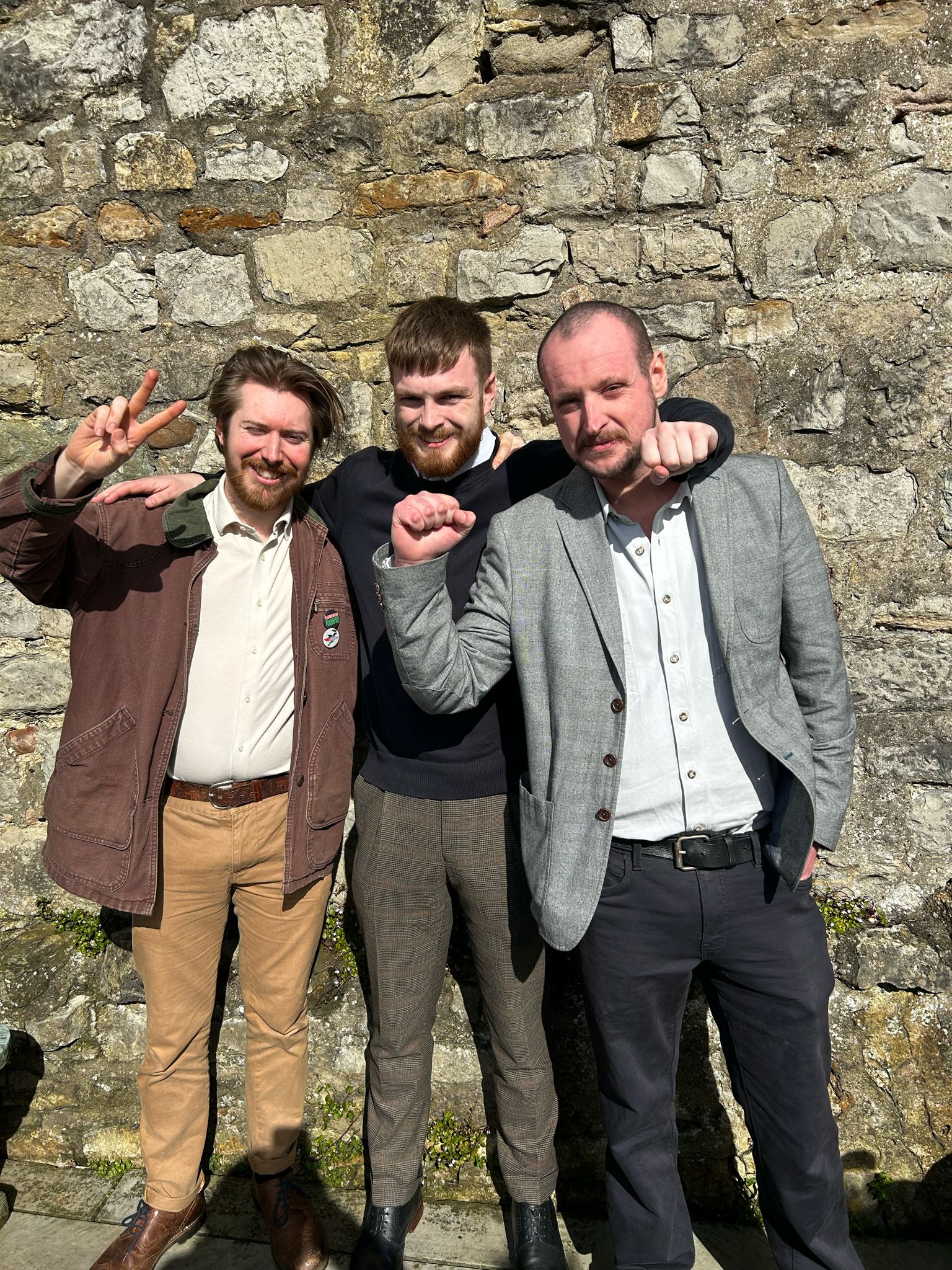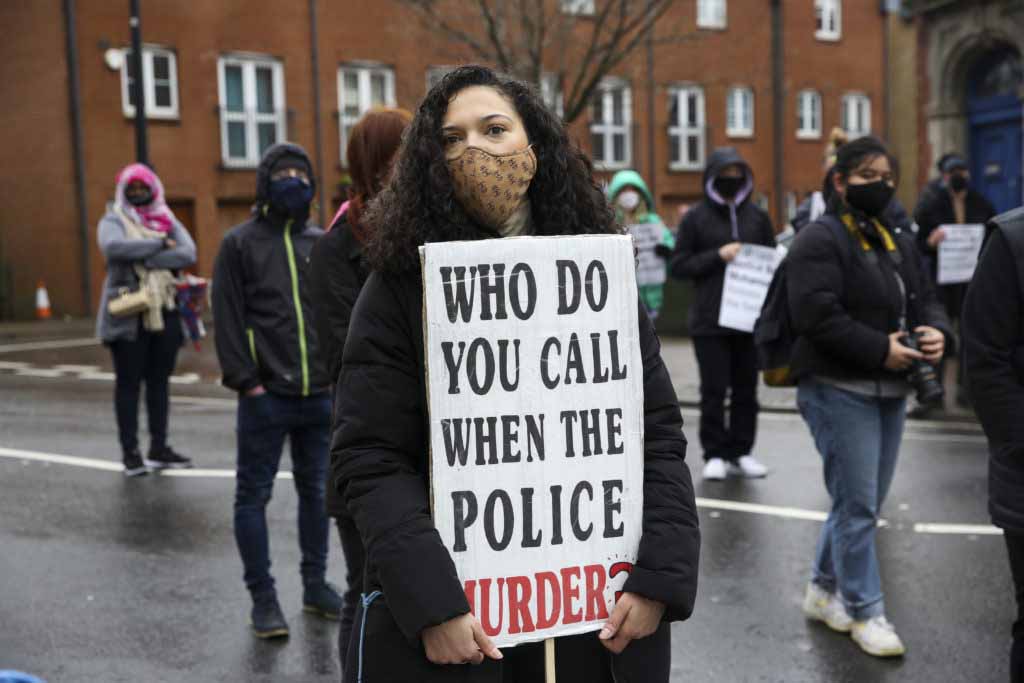
Solvay Three: Palestine Activists Hail Result Of ‘David Versus Goliath Trial’
Activists only ordered to pay a partial fine after five day trial in Caernarfon Crown Court.
Judge describes ‘most moving’ speech about the need to take action against genocide in Gaza.
By George Mills. Cover image, defendants, from left, Thomas Bell, Owain Parry and Mark Redfern.
The trial of the ‘Solvay Three’ concluded on Friday 19th of April at Caernarfon Court, bringing an end to what the defence described as a ‘David versus Goliath case’.
The three were on trial over a factory occupation in Wrexham in 2021 coordinated by the group Palestine Action, where they had sought to disrupt the supply of military equipment being sent to Israel and used in the killing and persecution of Palestinians.
During the trial, Solvay admitted to making parts for the F-35 fighter jet, which is known to be used by the Israeli military.
One the eve of the verdict, the prosecution offered the defendants Owain Parry, Mark Redfern and Thomas Bell a lesser punishment in the form of a fine if they were to accept a guilty plea.
Due to the fact that their legal defences had already been thrown out and the verdict would ultimately come down to whether the jury believed they had committed any criminal damage or not, Mr Parry pleaded guilty in the morning to 1 count of criminal damage and was fined a total of £534.
The judge had described all of the defendants as, ‘of good character, with no previous convictions, who have done a lot for their communities’. She continued, ‘If there is to be a guilty plea, I know your feelings are well entrenched, but I will allow you to make a closing statement’.
The prosecution claimed that Solvay’s losses were in excess of £60,000 including the loss of production at the factory on the day of the protest. However, the judge did not believe it to be appropriate for the defendants to pay such damages, due to financial situations of those in question, and that Solvay is an ‘international, multi-billion-pound company’. Instead, she believed it best for the fines to go towards the emergency services to recuperate costs from attending the protests and removing the defendants from the scene.
Upon delivering Mr. Parry’s sentence, the judge remarked that he, ‘Did an honourable thing’, she continued, ‘As part of the Welsh Underground Network, you were approached by an organisation more sophisticated than yourselves’ referring to Palestine Action. ‘You were a young man with ideals. You were told about what was being made at the factory, believed them, and acted upon it. You have served your community well from a young age, and that goes in your favour’.
At the time, all men had been members of the Welsh Underground Network, but the occupation was coordinated by Palestine Action.
The remaining two defendants, Mr. Redfern and Mr. Bell, decided to maintain their not guilty pleas, leaving the verdict for the jury to decide. The judge reminded the jury that the defendants had no legal defences left, “You (the jury), are here to decide if the actions constitute damage. You should take the defendant’s good character and total lack of previous offences or since, into consideration,” she said.
The prosecution then began their closing statement, within which they made little to no reference to the military equipment that was produced at the factory, as had been admitted by the Solvay site director earlier in the week. The prosecution then continued to denounce Palestine Action as ‘sinister, shadowy figures’, stating that the defendants had committed the crime for, ‘maximum publicity with minimum effort’.
They continued, “We live in a functioning democracy, where there are correct channels to do such things,” in reference to the defendants’ actions to stop the supply chain of weapons and equipment headed for Israel. This statement was met by a handful of scoffs and raised eyebrows by those sitting in the gallery watching the trial. “I do not doubt that they are good people,” referring to the two remaining defendants, “However, someone waiting for an ambulance on that day might not agree.”
The first of the defendants to give their closing statement was Mr. Bell, who had at this stage, elected to represent himself to deliver his statement, which read, “Ladies and gentlemen of the jury, the right to protest is a very human right. And I mean not only in the eyes of the law, but as something innate to human behaviour, we feel the need for action when we believe something is wrong.”
“Wales is my home and has always been a nation of peace and a place that has a door open for those who need somewhere to keep warm. In 1923, the women of Wales organised an unprecedented appeal. 390, 296 women signed a memorial petition through the Welsh League of Nations Union, appealing to the women of America ‘from home to home’ and ‘hearth to hearth’, to join them in a call for ‘Law not War’. It was noted that the final petition was over 7 miles in length, all handwritten by the beautiful women of Wales.”
“The list of names is being digitised online and you can even see the addresses these women lived at. Maybe you’re from a house of a woman who demanded peace. Now I stand before you today as a man of Wales. A man who knows well what it means for a people to be disregarded in their own home, left defenceless.”
“We know, that in the eyes of the law, that we have been left with no legal defence to rely on for our actions. But our actions need no defence, for we do not defend them. We have no regrets and carry no guilt. We have only played our part in the story of peace in Wales, and there will be a happy ending to that story, like the fairy tales told to us as children.”
He continued, “But the children in Palestine aren’t as lucky. I mentioned the other day (referring to his own testimony) the story of the Bakr children on the beach in Gaza. Cousins, family, playing football and other games under the hot sun. They heard no fairytales, only the singing of drones day in and day out, until the last thing they heard was the screams of each other dying. They were so young.”
“I ask myself these questions; what line do we draw in the sand? How many links in the chain around the neck of the disenfranchised is enough for us to get to sleep at night? How complicit are we willing to be? Companies think they are above the law, but I don’t believe that’s right.”
He concluded with the poem ‘If I Must Die’ by Palestinian scholar, writer and activist Refaat Alareer, who was targeted and killed by Israeli drones in December 2023. The full poem is published below.
The court and many members of the jury were clearly moved by Mr. Bell’s passionate speech, for which the judge thanked him for and admitted, “I wouldn’t have allowed your representatives to get away with that much, however, that was the most moving speech I have ever heard in this courtroom.”
The final closing statement was issued by Mr. Redfern’s solicitor. She gave context on the actions of the defendants, stating how they deliberately targeted elements of the factory purely to halt production, and not to harm anyone. She described Mr. Redfern as, “diligent, practical, curious and careful.”
She continued, “These were not the actions of just an angry man on a whim. He received a tip about the factory and did his own thorough research to confirm this. He has a history of researching and publishing on the issue,” referring to Redfern’s work for voice.wales and Planet Magazine, “He is intelligent, careful and precise.”
The defence then went on to discuss the state of the roof, that nobody had been up there to conduct a survey in years and suggested that the company would not be able to verify the condition of its equipment on the roof because of this. She then described how the equipment was “brittle and in poor condition, it has not nor will be repaired. Solvay are a multi-billion-pound company, they can afford to pay for any necessary repairs.”
Finally, the defence solicitor began to discuss how the company’s structure is unclear, as is what they produce, and began to use the prosecution’s phrase of ‘shadowy figures’ against them, however the judge overruled this. Having now heard all the evidence and closing statements, the jury were sent to confer and produce their verdict.
Upon returning over half an hour later than intended, the jury finally delivered their guilty verdict for the two remaining defendants. The judge however, handed Mr. Bell and Mr. Redfern the most lenient sentence possible, also giving them a fine and no community order, but were ordered to pay £15 more each than Mr. Parry.
The trial finally concluded with the judge thanking the jury and the court and allowed the three defendants to leave. She reminded them that the items confiscated off them will be destroyed and not returned, such as their ladder, tent, fire extinguishers and flares. “What about the crowbar, your honour?” asked Mr. Redfern, who’s question was met with a flurry of laughter from inside the court. “You won’t be getting that back either, Mr. Redfern.” she replied with a wry smile.
A fundraising page is being set up for the defendants, with details to follow.
“IF I MUST DIE”
BY REFAAT ALAREER, (as read to the jury by defendant Thomas Bell)
If I must die,
you must live
to tell my story
to sell my things
to buy a piece of cloth
and some strings,
(make it white with a long tail)
so that a child, somewhere in Gaza
while looking heaven in the eye
awaiting his dad who left in a blaze—
and bid no one farewell
not even to his flesh
not even to himself—
sees the kite, my kite you made, flying up above
and thinks for a moment an angel is there
bringing back love
If I must die
let it bring hope
let it be a tale

